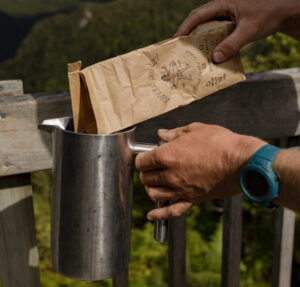Our Sustainability approach
Our philosophy is ‘education through experience’, seeking maximum enjoyment with minimum impact. We’ve always believed in using our adventures as a force for good.
As tourism gradually returns to pre-pandemic levels, it’s more important than ever for us to champion and celebrate more community-friendly and environmentally conscious ways of seeing New Zealand.
The New Zealand bush is a tāonga – a treasure for all. It must be preserved for future generations. We are all spiritually connected to our land so when the land is healthy, we are healthy.
The areas we walk in are exceptional, but fragile natural ecosystems. We love to share our knowledge about the ecological processes at work and how we can best operate within them, while enhancing our visitors appreciation of the unique natural and cultural identities of our whenua (land).
As kaitiaki (guardians) of our forests, we act as ambassadors for conservation when we share these environments with our guests.
Sustainable Tourism vs. Regenerative Tourism
Sustainable tourism seeks to harm nothing and no-one, but regenerative tourism aims to achieve greater impact by leaving a place better than when we arrived. Walking Legends is committed to regenerative tourism and we weave these threads through our communities to make sure our natural environment remains pristine for generations to come.

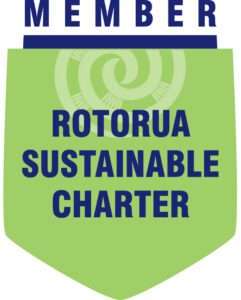
Our Journey Towards Carbon-Neutral Certification
We have made a commitment to become carbon-neutral by 2030. In 2025, we are right at the start of our carbon-emissions lowering journey. Follow us on social media where we’ll share our highs, lows, wins and losses and all the valuable things we’ve learned in the process!
How We Put Care Into Practice
We take practical, everyday steps to protect our environment, such as:
Sustainability By Design
- Keeping groups to a small size on our guided walks helps us to achieve these objectives and still enjoy a true New Zealand wilderness experience.
- Improving our itineraries to reduce driving times and making our movements more efficient.
- Reducing our reliance on single-use plastic, you can help us by bringing along a reuseable water bottle. Keep Cups for hot drinks are great as well! We’ll package your lunches in reuseable sandwich wraps, kept together in a robust cooler bag that is yours to use for the trip.
- We choose to work with accommodation providers that care about reducing their carbon footprint and we support them by advocating for more responsible tourism and educating all of our guides and guests on how to care for Aotearoa/New Zealand.
Making Our Purchases Matter
- Our guides wear 100% New Zealand-made merino clothing by Earth, Sea, Sky & Glowing Sky.
- We buy free-range eggs and fair trade coffee. We are building up our offering to include New Zealand made products that are sustainably packaged and low or free of unhealthy ingredients – like Crafty Weka bars for example. Their delicious range of muesli bars are packaged in a special cellophane that worms can eat so we don’t need to stress about that tiny piece of plastic that always escapes your pocket when you go in for tissue!
- We support local businesses wherever possible, like the coffee we drink; our suppliers are Aotea Roast Great Barrier Island, Coffee Lala Coromandel, Mourea Coffee Rotorua, Boasters Coffee Rotorua and Incafe Coffee, New Plymouth.
- We have transitioned from a petrol-powered lawn mower to a Stihl electric one for our HQ.

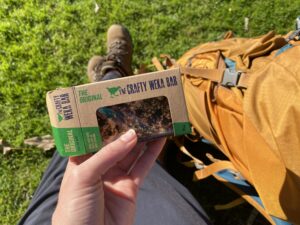
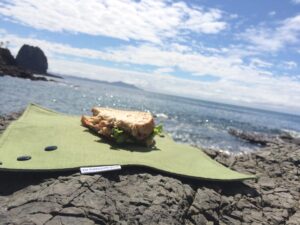
Closed-loop Products & Life-cycle Responsibility
- Managing our waste, separating recyclables, composting food waste, returning as much as we can back into the organic cycle and sending as little as possible to landfill.
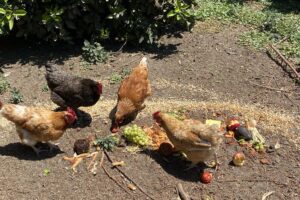
Effecting Real Change Through Real Action
- We spend time in our off-season volunteering with local conservation projects. You can support them too! We’ve cleared trap lines in kōkako habitat with the Rotoehu Ecological Trust, and replaced bait stations to help kiwi chicks survive in the Otanewainuku Kiwi Trust project area, as well as planted native seedlings along the Wharere Canal at Pukehina Beach with Sustainable Coastlines.
- Donating to environmental projects run by passionate people to protect endangered endemic species, like the $500 donation we made to Eastern Whio Link to keep pests out of whiō nesting sites in northern Te Urewera and the backyard lizard project we helped Oruawharo Medlands Ecovision with on Great Barrier Island.
- We have been caring for hectare #189 in the Lake Rotopounamu forest since 2015 with Project Tongariro.
- Guests on our Coromandel Explorer tour have planted over 220 native Kauri tree seedlings.
- We sponsor a pest trap within the Glenfern EcoSanctuary on Aotea/Great Barrier Island through their Adopt A Trap programme, specifically to protect black petrel, for whom Great Barrier is the only viable nesting site in the world.
- We donate to Karen Walker Bird Rescue on Aotea/Great Barrier Island through the Aotea/Great Barrier Island Environmental Trust.
Accreditations
All our trips are run according to our Environmental Policy, which incorporates the Department of Conservation’s Environmental and Water Care Codes.
We are Department of Conservation Concessionaire Holders – License number ECHB-24575-GUI.
We hold a GOLD Award from Qualmark which recognises the best sustainable tourism businesses in New Zealand, validating our commitment to excellence in sustainable tourism.
We support the Tiaki Promise, care for New Zealand code of ethics.
We have committed to the New Zealand Tourism Industry Association’s Tourism Sustainability 12-step programme.
We are members of the Rotorua Sustainable Charter, a member organisation dedicated to promoting sustainable practices within the Rotorua district.
In 2024, we were part of a cohort of Bay of Plenty tourism operators to undergo the sustainability training programme, The Green Room/Te Ruma Kakariki, with Envirohub Bay of Plenty.
Environmental Practices
Environmental performance and practices are hugely important to us and we are always looking at ways to improve the way we do things.
We have started a biodiversity ark at our headquarters. Our goal is to create a rich food resource for native birds that travel between the Otanewainuku and Rotoehu ecological areas. The site area we’re working with is around 2,800 square metres. A site of this size is too small to qualify for any grants or funding, so the success of this project is entirely credited to our Walking Legends guests, who have supported us in this endeavour by choosing to walk with us.
When we began in 2009, the site was overrun with pest plants like wild ginger, wandering dew (tradescantia), English ivy, privet and blackberry. Little by little we’ve been removing overgrown exotic tree species and replacing them with native taonga species. We now have 37 species of native trees and plants that provide a useful resource for our guides to learn their New Zealand flora. Many of the plants have come from our local nursery, Pongakawa Hilltop Nursery.
In 2025, we’ve reached a milestone point where many of our natives are now producing their own seedlings and we’ve just welcomed the return of our first kereru (NZ wood pigeon), the first we’ve seen since 2009! The kereru is an important part of the New Zealand ecosystem because they are the only bird large enough to swallow and then digest the berries of our podocarp trees, like miro and tawa, making them one of the only bird species that can assist with the distribution and longevity of these special trees.
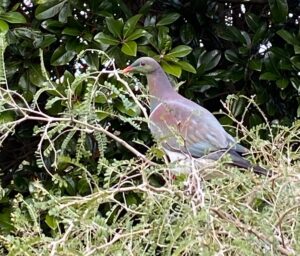
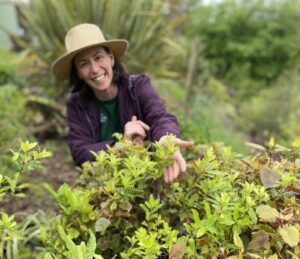
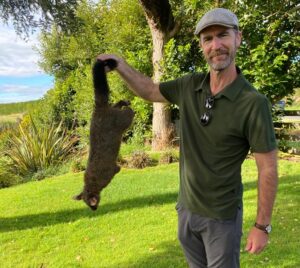
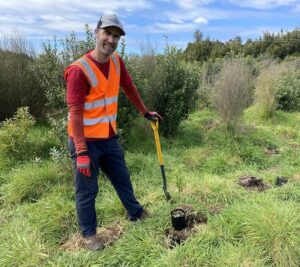
Not only is it important to plant ‘food’ for native birds, we must also protect them from predation while they’re on our site. We support and align with the Predator Free 2050 iniative to protect our native fauna from pest species that were introduced by humans. We have a regular pest trapping programme that targets possums, rats, mice, stoats, weasels and hedgehogs. We’re currently using two tools; Good Nature traps and a Flipping Timmy. We have had DOC 200 traps on the site in the past, supplied by Predator Free Bay of Plenty, but found the application quite difficult on our particular site.
If you have a project that Walking Legends could help with please get in touch with us.
